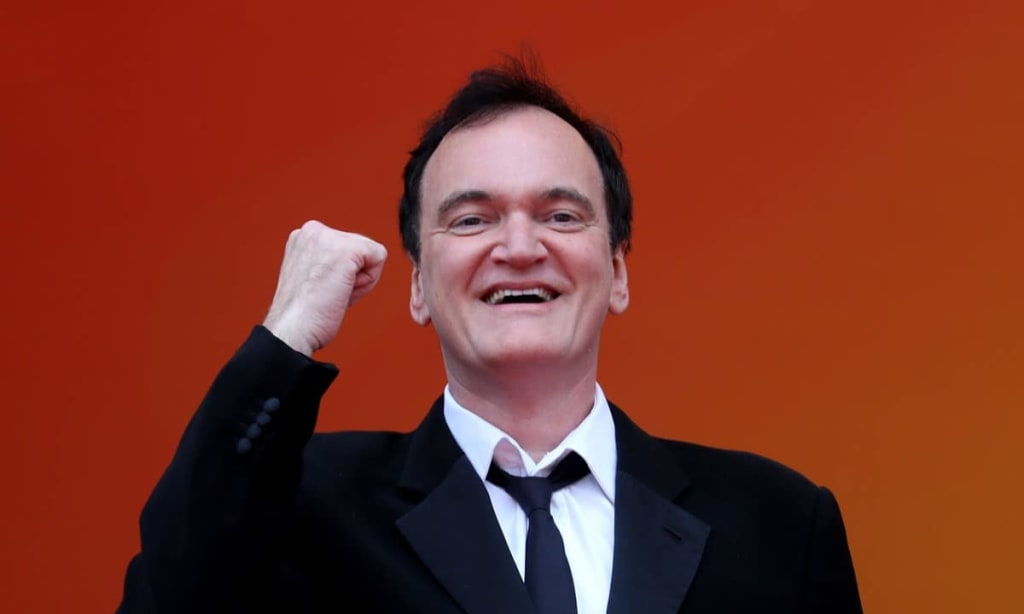My Love Affair with Quentin Tarantino
A Literary Genius

I discovered Tarantino when I was 11. My uncle handed me a CD that he had borrowed from a video library. It was a thing back then. It had a picture of an actress lying on her chest, smoking a cigarette. The cover said - Pulp Fiction.
He had probably borrowed it because he was a fan of John Travolta. I was too stupid to understand it. But that was the first time I ever watched a Tarantino movie, without having any idea about the genius that he is.
After 8 years when I rewatched the movie, I was blown away. What in the world just happened? The dialogue, the dance sequence, the violence and the humour; everything seemed so peculiar. I had seen movies that juggle in past and present. But, here's a film that had short films within; and it was tied up by a non-linear narrative.
Inglorious Bastards happened right after that. Then, I thought I needed to check out this guy. Quentin Tarantino. I watched all the movies he had made till then, and I totally fell in love with his style of movie-making. Till now, I have watched each of his movies, at least twice.
In the wake of Coronavirus, a lockdown was implemented across the world. I had some time in hand as I was WFH. I always wanted to write a story. Rather, tell a story. So, I attempted my first work of fiction.
Now, I have always viewed Tarantino's work as a literary masterpiece. And when I wanted to write my own pulp fiction, who else could I turn to. None other than Quentin Tarantino.
I read every possible article that I could and watched most of his interviews that were available in the public forum. My love affair with Tarantino's movies began in 2008. But when I dug deeper into his writing style, I became obsessed with him. This is what I found.
His plots are character-driven
Tarantino believes in writing characters rather than creating a blueprint of the plot. Because once he knows his characters, they are the ones to drive the plot. He writes an extensive back story of his primary characters even though he knows that he is not going to shoot them.
Not having a blueprint of the plot might freak out a lot of writers. But he thinks that once the story reaches the middle, the characters will decide the fate. He finds it silly to think beyond the middle because by the time your reach there, it's a different story altogether. But as you know the characters so well by then, you can let them take it ahead. Trusting the process is what he calls it.
In his Agatha Christie-style mystery - The Hateful Eight, there is a particular scene where someone poisons a pot of coffee. Now, most writers would reverse engineer the plot. But, Tarantino discovered the culprit as he wrote the chapter and let the characters reveal it.
Revealing characters through dialogues
In most of Tarantino's movies, we see the characters talking about mundane things or discussing pop culture. One might think that how does that add up to the story. Why can't he stick to the point?
Well, he is absolutely sticking to the point. He gives a particular situation and let the characters talk about it. As we watch the scene, we gradually get to know more about the characters. And, by the time the movie reaches the tipping point, everything makes sense.
A classical example would be the first scene of Reservoir Dogs. You can rewatch it here.
The argument about tipping between Mr Pink and Mr White gives a hint about the stark contrast in their characters. Mr Pink is basically a mean thug who is not concerned with anyone else but himself because he doesn't want to tip the waitress. Whereas, Mr White argues that the waitress' can make a living out of their tips. This shows that Mr White is empathetic to the waitress. This scene acts as a platform for the plot to uncover.
Elmore Leonard, a crime novelist, has been one of the biggest influences in his life when it comes to writing dialogues. He even adapted one of his hit novel Rum Punch into Jackie Brown.
Using personal experience
Tarantino stayed in a one-room apartment in Amsterdam when he wrote Pulp Fiction. If you recall the famous 'Royal with cheese' scene where Vincent Vega(played by John Travolta) is fascinated by the hash bars in Amsterdam; that's actually no one but Tarantino talking about his personal experiences in Europe.
He sticks up his autobiography in genre pieces to the point that he feels embarrassed to show it to the people who know him. In one of his interviews, he even disclosed that Kill Bill was insanely personal. He feels that adding his individual experiences enhances the emotion in the sequence. Imagine, if you are going through a tough time in your life and you add that episode to one of your character's life. It will add a layer to the character and move the plot ahead.
Three act structure
One aspect that is specific to all of his movies is that the story unfolds organically. According to him, the audience does not need to be spoon-fed. As long as they know that they are in good hands, people don't mind taking a little bit of time to understand the context.
He develops a three-act structure for the story.
- Act I - The characters know exactly where they come from, and what they are up to. But, the audience doesn't have a hint about their motives.
- Act II - The audience catches up with the characters.
- Act III - The audience knows more than the characters know about each other.
It's about the page
He writes like it's his contribution to the literary world. He never thinks about the movie when he writes. He writes it like a novel with extensive prose.
Writing for him is process-oriented. It's about the journey, as he says, that makes the destination worthwhile. He wants to fall in love with his own script so much so that he would want to go ahead and turn it into a movie.
Reinventing old stories
It's no secret that Tarantino can't get enough of the Spaghetti western genre. The Mexican Standoffs or the style of dialogue shows an enormous influence in his writing as well as direction. He has been obsessed with Sergio Leone's movies.
He has never denied ripping off old scenes as a tribute. But he recreates them in his own way. For instance, Django Unchained was a mix of 70s blaxploitation and Spaghetti western. The non-linear narrative that he adapted for Pulp Fiction was again inspired by the French New Wave cinema that emerged in the late 50s. The amalgamation of the genres leads to something new that has never been done.
Creating mythology
Tarantino has his own universe of characters. Did you know that Vic Vega(Michael Madsen) and Vincent Vega(John Travolta) are related to each other as brothers? Tim Roth's character from The Hateful Eight is related to Michael Fassbender's in Inglorious Bastards. Both are Englishmen. They all come from a common universe. If you carefully listen to the dialogues in his movies, you'll notice the subtle references.
Not just the characters, Tarantino developed his brands of cigarettes and burgers. Rick Dalton (Leonardo Dicaprio) is seen endorsing Red Apple cigarettes at the end of OUATIH. This fictional brand was introduced for the first time in Pulp Fiction. Big Kahuna Burgers is another fictional chain of burgers that keeps showing up on billboards in most of his movies. Tarantino has created a mythology around the characters like Marvels or DC.
Tarantino has completed almost 30 years in Hollywood. Staying relevant for that span of time is a humongous task. He has been criticized multiple times for the depiction of excessive violence in his movies. But as he says, I want to tell the truth. And he doesn't shy away from it.
He has declared that he will be making only 10 movies in his entire career. He has already finished 9 out of it, and I am eagerly waiting for his last one. But even after that, my love for his movies shall always remain.
About the Creator
Vaibhav Bhosle
Hi,
I am Vaibhav, a Finance guy by profession; intend to share my learnings with the world
Enjoyed the story? Support the Creator.
Subscribe for free to receive all their stories in your feed. You could also pledge your support or give them a one-off tip, letting them know you appreciate their work.






Comments
There are no comments for this story
Be the first to respond and start the conversation.